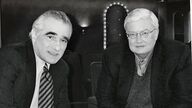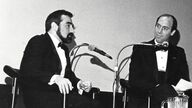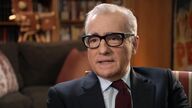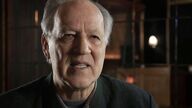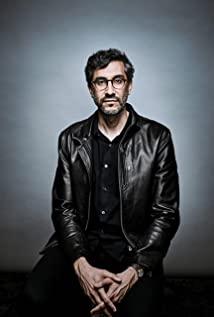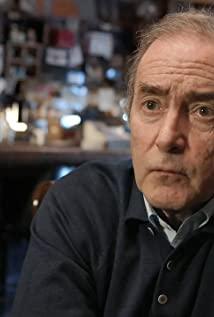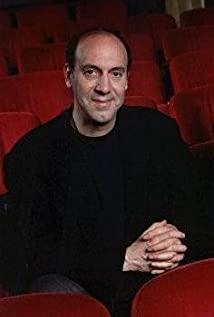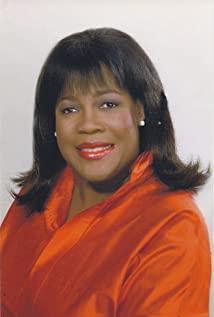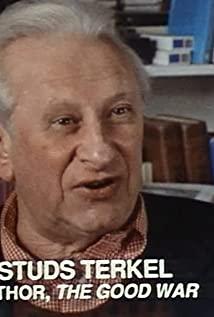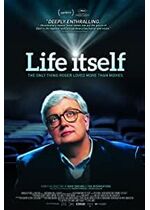-
Roger Ebert: There are no strangers in family: I loved and am loved.
-
Roger Ebert: In the past 25 years I have probably seen 10,000 movies and reviewed 6,000 of them. I have forgotten most of them, I hope, but I remember those worth remembering, and they are all on the same shelf in my mind.
-
Roger Ebert: Look at a movie that a lot of people love and you'll find something profound no matter how silly the film may seem.
-
Roger Ebert: We're both consious of the passage of time, of it's flow, slipping through our fingers, like a long silk scarf.
-
Rick Kogan: I don't know Pauline Kael. I never knew Pauline Kael, but fuck Pauline Kael. Roger Ebert and Gene Siskel were the most powerful critics of all-time in any realm.
-
[first lines]
Roger Ebert: We all are born with a certain package. We are who we are. Where we were born, who we were born as, how we were raised. We're kind of stuck inside that person... and the purpose of civilization and growth, is to be able to reach out and empathize a little bit with other people. And for me, the movies are like a machine that generates empathy. It lets you understand a little bit more about different hopes, aspirations, dreams and fears. It helps us to identify with the people who are sharing this journey with us.
-
[Director Steve James is filming Roger in the hospital where he's just shown him the new chair he will use]
Steve James: So Roger, did you not pay your insurance premiums, and so you didn't get the chair till now?
Roger Ebert: [through voice synthesizer on his laptop] Steve, I'll do the jokes here.
-
Roger Ebert: When I mentioned in my blog that I could no longer eat, drink, or speak, a reader wrote, "Do you miss it?" Not so much, really. I lived in a world of words long before I was aware of it. The new reality took shape slowly. My blog became my voice, my outlet. It let loose the flood of memories. They came pouring forth in a flood of relief.
-
Roger Ebert: From the day the Chicago Tribune made Gene Siskel its film critic, we were professional enemies. For the first five years we knew one another, Siskel and I hardly spoke. When Gene and I were asked to work together on a TV show, we both said we'd rather do it with someone else. Anyone else.
-
[Siskel and Ebert are on "The Tonight Show with Johnny Carson" seated next to Chevy Chase]
Johnny Carson: Is there something out there that is really so bad?
Roger Ebert: I can't really recommend ¡Three Amigos!. It's the Christmas picture I like the least.
[audience groans]
Johnny Carson: This is the happy hour. I don't think I'd ask you if I knew you were gonna say that.
Roger Ebert: Chevy Chase has made a lot of good movies, and God willing, he will make a lot more good movies in the future.
Chevy Chase: With your help.
[as Ebert continues to talk, Chevy begins miming Ebert behind his back mockingly; the audience is giggling]
Roger Ebert: There is a tendency for somebody... who is naturally funny, as Chevy is, to try to get laughs by standing there and ad-libbing when somebody else is trying to talk!
-
Ava DuVernay: I was, I think, I was maybe eight or nine or something, and my Aunt Denise, who was a massive film geek, who passed her film geekdom onto me, found out about these rehearsals for the Oscars, and one day he walked through. And I remember saying, "Thumbs up! Thumbs up!" screaming, screaming, and he came over. I grew up. I made this film when I was 34 years old. It was the first film I ever made. The film was about my aunt, my aunt who took me to the Oscars that day. And about losing someone that you love. And it was Ebert's review that really got to the heart of what I was trying to articulate. And just touched me so much, that I sent him the picture from the Oscars. His reply was, "We were both younger then." The next day, a blog post turned up where he wrote, in a very heartfelt way, about his own aunt who kind of gave him the gift of art and film as well. You know, I broke down crying, and it was a mess. It's dangerous as a black woman to give something that you've made from your point of view, very steeped in your identity and your personhood to a white man whose gaze is usually the exact opposite, and to say, you are the carrier of this film to the public. You're the one that's gonna dictate whether it has value. And you had a lot less fears around that with Roger. Because you knew it was someone who was gonna take it seriously, gonna come with some historical context, some cultural nuance. I mean, everybody knows Roger had a black wife. You know what I mean? You know. He's like an honorary brother. I mean, you live with a sister. That's a whole different understanding of black women, right? So maybe you watch my film differently.
Life Itself Quotes
-
Collin 2022-03-27 09:01:23
Real, peaceful, detailed, vivid, love.
-
Demario 2022-02-04 08:22:54
A complete and detailed review of Albert's life, from the death of his father in childhood, to joining the journalism industry when he was young, and then working hard in Chicago to achieve a good career, although Albert is not a theoretician, but he undertakes it very well. With the mission of popularizing film culture to the public, the film focuses on the last years of Albert, an ordinary and brave old man, who has a love for film and text, and a lot of gossip. I will turn out the Beauty Valley tonight and watch it.


